
Dale Farm is a plot of land situated on Oak Lane in Crays Hill, Essex, United Kingdom. Until October 2011, it was the site of one of the largest Traveller concentrations in the UK, at its height housing over 1,000 people, along with the adjacent Oak Lane site. Although Basildon District Council had granted permission for the site to be used by a small number of Traveller families, no planning permission was given for the expansion of the site into land located within the Green Belt.

Occupy Portland was a collaboration that began on October 6, 2011, in downtown Portland, Oregon, as a protest and demonstration against economic inequality worldwide. The movement was inspired by the Occupy Wall Street movement that began in New York City on September 17, 2011.
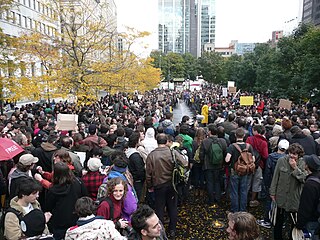
Occupy Canada was a collective of peaceful protests and demonstrations that were part of the larger Occupy Together movement which first manifested in the financial district of New York City with Occupy Wall Street, and subsequently spread to over 900 cities around the world.

Occupy London was a political movement in London, England, and part of the international Occupy movement. While some media described it as an "anti-capitalist" movement, in the statement written and endorsed by consensus by the Occupy assembly in the first two days of the occupation, occupiers defined themselves as a movement working to create alternatives to an "unjust and undemocratic" system. A second statement endorsed the following day called for "real global democracy". Due to a pre-emptive injunction, the protesters were prevented from their original aim to camp outside the London Stock Exchange. A camp was set up nearby next to St Paul's Cathedral. On 18 January 2012, Mr Justice Lindblom granted an injunction against continuation of the protest but the protesters remained in place pending an appeal. The appeal was refused on 22 February, and just past midnight on 28 February, bailiffs supported by City of London Police began to remove the tents.
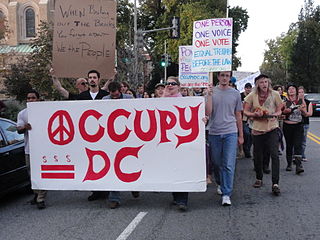
Occupy D.C. was an occupation of public space in Washington, D.C. based at McPherson Square and connected to the Occupy movements that sprung up across the United States in Fall 2011. The group had been demonstrating in McPherson Square since October 1, 2011, and in Freedom Plaza since October 6. Despite crackdowns on other Occupy projects across the country, federal authorities claimed on November 15 that they have no plans to clear McPherson Square Park. The National Park Service decided against eviction after meeting with activists and discussing health and safety conditions.

Occupy Minneapolis (OccupyMN) is a grassroots collaboration that began in October 2011 with a series of demonstrations in Minneapolis, Minnesota. Protesters have staged numerous occupations, most notably of the Hennepin County Government Center plaza.
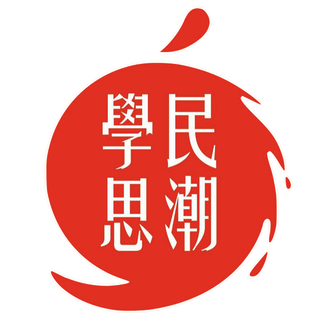
Scholarism was a Hong Kong pro-democracy student activist group active in the fields of Hong Kong's education policy, political reform and youth policy. It was reported to have 200 members in May 2015.

Occupy Central with Love and Peace (OCLP) was a single-purpose Hong Kong civil disobedience campaign initiated by Reverend Chu Yiu-ming, Benny Tai and Chan Kin-man on 27 March 2013. The campaign was launched on 24 September 2014, partially leading to the 2014 Hong Kong protests. According to its manifesto, the campaign advocates for an electoral system in Hong Kong that is decided through a democratic process and satisfies international standards of universal and equal suffrage. With the first three stages of the movement – dialogue, deliberation and citizens' authorization – the civil disobedience that follows must be non-violent.
Occupy Central may refer to:

The following lists events from 2014 in Hong Kong.

Joshua Wong Chi-fung is a Hong Kong pro-democracy activist and politician. He served as secretary-general of the pro-democracy party Demosistō until it disbanded following implementation of the Hong Kong national security law on 30 June 2020. Wong was previously convenor and founder of the Hong Kong student activist group Scholarism. Wong first rose to international prominence during the 2014 Hong Kong protests, and his pivotal role in the Umbrella Movement resulted in his inclusion in Time magazine's Most Influential Teens of 2014 and nomination for its 2014 Person of the Year; he was named one of the "world's greatest leaders" by Fortune magazine in 2015, and nominated for the Nobel Peace Prize in 2017.

A series of sit-in street protests, often called the Umbrella Revolution and sometimes used interchangeably with Umbrella Movement, or Occupy Movement, occurred in Hong Kong from 26 September to 15 December 2014.

The Umbrella Movement was a political movement that emerged during the 2014 Hong Kong protests. Its name arose from the use of umbrellas as a tool for passive resistance to the Hong Kong Police Force's use of pepper spray to disperse the crowd during a 79-day occupation of the city demanding more transparent elections, which was sparked by the decision of the Standing Committee of the National People's Congress (NPCSC) of the People's Republic of China of 31 August 2014 that prescribed a selective pre-screening of candidates for the 2017 election of Hong Kong's chief executive.

Alex Chow Wing-hong is a social activist from Hong Kong and current doctoral candidate in geography at the University of California, Berkeley. He is a former secretary-general of the Hong Kong Federation of Students and a former Vice-President (External) of the Hong Kong University Students' Union.
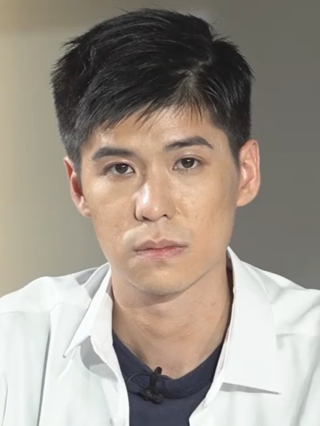
Lester Shum Ngo-fai is a Hong Kong social activist and politician. He was a leader of the 2014 pro-democracy protests in Hong Kong and served as deputy secretary-general of the Hong Kong Federation of Students (HKFS) from April 2014 to March 2015. He was a member of the Tsuen Wan District Council for Hoi Bun from 2020 to 2021.

The East Wing Forecourt of the Central Government Office, or Civic Square, is an open space in front of the East Wing of the Central Government Complex, Hong Kong, which is located in Tamar. It was once an area where protesters took part in protests and demonstrations. It was closed in July 2014, and reopened on 10 September 2014. For many, it represents democracy and freedom, and a place to express their discontent. It was occupied for a rally opposing the moral and national education school curriculum proposal in August 2012, and during the 2014 Hong Kong protests in September 2014. Since then, the square is closed by the government in order to prevent protests.
Gau Wu, is a Cantonese expression that was coined shortly after an interview clip in which the term was used was broadcast by HK cable TV in August 2014. The expression means "disorderly shouting" or "squabbling over nothing".
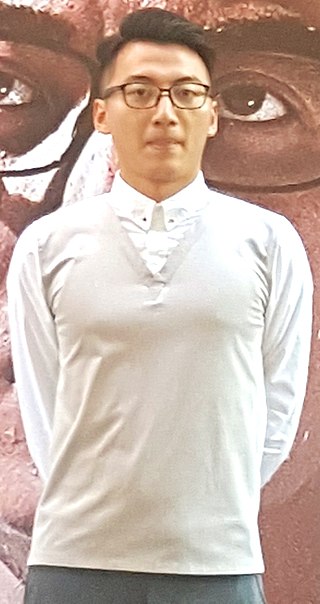
Alvin Cheng Kam-mun, also known as "Brother Four Eyes", is a Hong Kong political activist, a member of Civic Passion, and founder of student activist organization Student Front. In 2014, he led a rally in support of the Hong Kong Umbrella Movement during the G20 Brisbane summit.
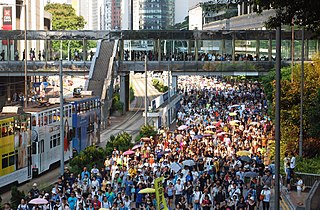
On 17 August 2017, three Hong Kong pro-democracy activists, Alex Chow, Nathan Law and Joshua Wong, were given prison sentences by the Court of Appeal for their roles in a protest at the Civic Square in front of the Central Government Complex in Tamar, Admiralty, on 26 and 27 September 2014. The events at the Civic Square helped set off massive pro-democracy protests, sometimes referred to as the Umbrella Movement, which lasted until police cleared the last of the protest sites in December 2014.

Squatting in the Republic of Ireland is the occupation of unused land or derelict buildings without the permission of the owner. In the 1960s, the Dublin Housing Action Committee highlighted the housing crisis by squatting buildings. From the 1990s onwards there have been occasional political squats in Cork and Dublin such as Grangegorman, the Barricade Inn, the Bolt Hostel, Connolly Barracks, That Social Centre and James Connolly House.




















